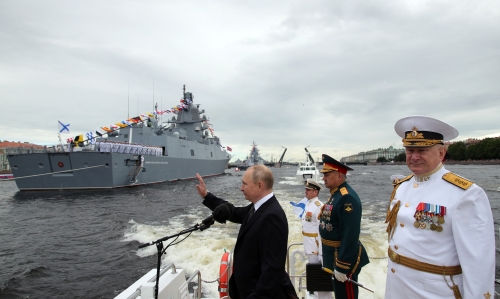Putin hopes a Trump win would change course for Russia
AFP | Washington
The Daily Tribune – www.newsofbahrain.com
President Vladimir Putin has no doubt he will secure another term in Russia's election. The vote that leaves him in suspense, and could do more to change his policies, will occur eight months later in the United States.
Putin has publicly said he prefers US President Joe Biden to his predecessor and aspiring successor Donald Trump, a remark widely interpreted to mean exactly the opposite, as the former KGB man hopes his notoriety will boost the Republican mogul.
Trump has voiced admiration for Putin, raged against NATO, the alliance founded to defend against Moscow, and boasted that he within one day would end the war in Ukraine, which Russia invaded two years ago.
Trump supporters in Congress, seizing on an unrelated dispute over migration, have held up approval of $60 billion in military aid for Ukraine, whose troops have faced the first battlefield setbacks in months as ammunition runs scarce.
Biden in his annual State of the Union address lashed out at Trump for saying he would encourage Putin to "do whatever the hell you want" if a NATO member does not spend enough.
"My message to President Putin, who I've known for a long time, is simple," Biden said. "I will not bow down."
Leon Aron, a senior fellow at the American Enterprise Institute who studies US-Russia relations, expected Putin to wait for the US election before any significant new move, militarily or diplomatically, on Ukraine.
"I don't expect any Russian attempt at some sort of major offensive in Ukraine which would cost them several hundred thousand men. The reason is that Putin is waiting to get a good deal on the cheap," Aron said.
He said Trump in a new term could block arms to Ukraine and "the only question-mark then would be how much Europe has been scared" into stepping up its own support to Kyiv.
- Trump psychology -
In one of his most widely criticized moments as president, Trump, appearing awestruck at a meeting in Helsinki, took at face value Putin's denial of US intelligence findings that Russia interfered in the 2016 election to back Trump over Hillary Clinton.
Fiona Hill, a former White House adviser who has said she was so alarmed by the news conference that she considered faking a medical emergency to stop it, said Trump saw Putin as "an iconic figure."
"He's somebody who's able to get his way and he looks like the ultimate strongman," Hill, who testified in Trump's first impeachment, told a recent conference of conservatives opposed to Trump.
But Hill acknowledged that Trump did not block many measures against Russia. She said his psychology was more that he did not want to feel "humiliated" in person by a "peer."
Asked about the recent death in prison of Russian opposition leader Alexei Navalny, which Trump has made light of, Hill said that Trump's reaction if Navalny had died during his administration would depend "if it reflected on him or not."
"If somebody had actually said that this was a sign of American weakness, that we couldn't keep Navalny safe," she said, "that would have changed Trump's perception."
"It's just as capricious as that, I'm afraid."
- Admirers -
Russia has turned into a partisan dividing line in the United States, a development unthinkable in an earlier era when most Americans viewed the Soviet Union as a top threat.
Some conservatives have embraced Putin as a guardian of what they see as traditional Christian values including opposing LGBTQ rights.
Tucker Carlson, a talk-show host close to Trump, in February interviewed Putin and showed viewers a Moscow subway station which he said was "nicer than anything in our country" with no graffiti or "foul smells."
His interview was widely criticized for lacking tough questions, with even Putin saying he expected Carlson to be more aggressive.
On the policy side, figures including Senator J.D. Vance and Trump-era Pentagon official Elbridge Colby have argued that Russia and Ukraine are a distraction from a greater threat from China.
Senator Mitch McConnell, a strong backer of Ukraine, recently announced he would step down as Republican leader, acknowledging his party has shifted.
But John Herbst, a former US ambassador to Ukraine and now senior director of the Atlantic Council's Eurasia Center, said it was ultimately a "tiny group" within the Republican Party that supported Putin.
He noted that Trump approved Javelin anti-tank missiles to Ukraine, a step resisted by his predecessor Barack Obama, and that Trump has not explicitly opposed new aid to Kyiv.
"There is some difference between things Trump has said and things his most fervent acolytes have said. So the Russians could be disappointed were Trump to win," Herbst said.
Related Posts

